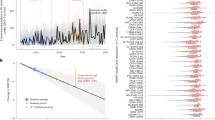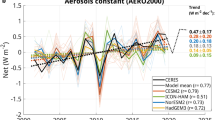Abstract
A major challenge facing climate scientists is explaining to non-specialists the risks and uncertainties surrounding potential changes over the coming years, decades and centuries. Although there are many guidelines for climate communication, there is little empirical evidence of their efficacy, whether for dispassionately explaining the science or for persuading people to act in more sustainable ways. Moreover, climate communication faces new challenges as assessments of climate-related changes confront uncertainty more explicitly and adopt risk-based approaches to evaluating impacts. Given its critical importance, public understanding of climate science deserves the strongest possible communications science to convey the practical implications of large, complex, uncertain physical, biological and social processes. Here, we identify the communications science that is needed to meet this challenge and the ambitious, interdisciplinary initiative that its effective application to climate science requires.
This is a preview of subscription content, access via your institution
Access options
Subscribe to this journal
Receive 12 print issues and online access
$209.00 per year
only $17.42 per issue
Buy this article
- Purchase on Springer Link
- Instant access to full article PDF
Prices may be subject to local taxes which are calculated during checkout



© ISTOCKPHOTO.COM / RSARAIVA

Similar content being viewed by others
References
Lorenzoni, I. & Pidgeon, N. F. Public views on climate change: European and USA perspectives. Clim. Change 77, 73–95 (2006).
Brechin, S. R. in Routledge Handbook of Climate Change and Society (ed. Lever Tracey, C.) 179–209 (Routledge, 2010).The most complete current analysis of public beliefs and attitudes regarding climate change, with good international coverage including the developing world.
Compston, H. & Bailey, I. (eds) Turning Down the Heat: The Politics of Climate Policy in Affluent Democracies (Palgrave Macmillan, 2008).
Lorenzoni, I., Nicolson-Cole, S. & Whitmarsh, L. Barriers perceived to engaging with climate change among the UK public and their policy implications. Glob. Environ. Change 17, 445–459 (2007).
Dunlap, R. & McCright, A. in Routledge Handbook of Climate Change and Society (ed. Lever Tracey, C.) 240–259 (Routledge, 2010).
Oreskes, N. & Conway, E. M. Merchants of Doubt (Bloomsbury, 2010).A provocative historical and political analysis of attempts to create uncertainty and interpret it as reason for inaction.
Corner, A. Do climate change skeptics give skepticism a bad name? Guardian Environment Blog Online (22 February 2010); available via http://go.nature.com/MoX91n.
House of Commons Science and Technology Committee The Disclosure of Climate Data from the Climatic Research Unit at the University of East Anglia. 8th Report of Session 2009–2010, HC-387-1 (Stationary Office, 2010).
Nehrlich, B. 'Climategate': paradoxical metaphors and political paralysis. Environ. Values 19, 419–442 (2010).
Climate of fear. Nature 46, 141 (2010).
Spence, A., Venables, D., Pidgeon, N. F., Poortinga, W. & Demski, C. Public Perceptions of Climate Change and Energy Futures in Britain: Summary Findings of a Survey Conducted in January-March 2010. Understanding Risk Working Paper 10–01 (Cardiff University, 2010).
Krosnick, J. The climate majority. The New York Times (10 June 2010); available via http://go.nature.com/uJJGSt.
Market & Opinion Research International Science in Society: Findings from Qualitative and Quantitative Research (Office of Science and Technology, 2005).
National Science Board Science and Engineering Indicators Ch. 7, 7.1–7.46 (National Science Foundation, 2006).
Poortinga, W. & Pidgeon, N. F. Exploring the dimensionality of trust in risk regulation. Risk Anal. 23, 961–972 (2003).
Kunzig, R. & Broecker, W. Fixing Climate (Profile Books, 2009).
Oppenheimer, M. Defining dangerous anthropogenic interference: the role of science, the limits to science. Risk Anal. 25, 1399–1407 (2005).
Schellnhuber, H. J. (ed.) Dangerous Climate Change (Cambridge Univ. Press, 2006).
National Research Council Advancing the Science of Climate Change (National Academies Press, 2010).An important recent statement of the US National Academies, emphasizing the integration of natural, social and decision sciences in advancing climate science and policy.
Bony, S. et al. How well do we understand and evaluate climate change feedback processes? J. Clim. 19, 3445–3482 (2006).
Pidgeon, N. F. & Butler, C. Risk analysis and climate change. Environ. Polit. 18, 670–688 (2009).
Trenberth, K. More knowledge, less certainty. Nature Rep. Clim. Change 4, 20–21 (2010).
Somerville, R. C. J. How much should the public know about climate science? Clim. Change 104, 509–514 (2011).
IPCC Climate Change 2007: Fourth Assessment Report (Cambridge Univ. Press, 2007).
Budescu, D. V & Wallsten, T. S. in The Psychology of Learning and Motivation (eds Busemeyer, J. R., Hastie, R. & Medin, D.) 275–316 (Academic, 1995).
Budescu, D. V., Broomell, S. B. & Por, H. Improving communication of uncertainty in the reports of the IPCC. Psychol. Sci. 20, 299–308 (2009).
Stern, N. The Economics of Climate Change: The Stern Review (Cambridge Univ. Press, 2006).
Corell, R. W. & Lee, K. N. (eds) Informing Decisions in a Changing Climate (National Academies Press, 2009).
Dietz, S., Hope, C. & Patmore, N. Some economics of 'dangerous' climate change: reflections on the Stern review. Glob. Environ. Change 17, 311–325 (2007).
Fischhoff, B., Lichtenstein, S., Slovic, P., Derby, S. L. & Keeney, R. L. Acceptable Risk (Cambridge Univ. Press, 1981).A critical analysis of fundamental approaches to making decisions about risk, treating risks as acceptable only in the context of compensating benefits.
Nordhaus, W. D. A review of the Stern review of the economics of climate change. J. Econ. Lit. 45, 686–702 (2007).
Weitzmann, M. A review of the Stern review of the economics of climate change. J. Econ. Lit. 45, 703–724 (2007).
Dessai, S. et al. Defining and experiencing dangerous climate change. Clim. Change 64, 11–25 (2004).
Lorenzoni, I., Pidgeon, N. F. & O'Connor, R. Dangerous climate change: the role for risk research. Risk Anal. 25, 1387–1398 (2005).
Estuary, T. 2100 Plan: Managing Flood Risk Through London and the Thames Estuary (Environment Agency, 2009).
Department for Environment, Food and Rural Affairs Adapting to Climate Change: UK Climate Projections (DEFRA, 2009).
Pidgeon, N. F., Lorenzoni, I. & Poortinga, W. Climate change or nuclear power — no thanks! A quantitative study of public perceptions and risk framing in Britain. Glob. Environ. Change 18, 69–85 (2008).
Rosa, E. A. & Clarke, D. L. in Research in Social Problems and Public Policy Vol. 7 (eds Youn, T. I. K. & Freudenburg, W. R.) 21–57 (JAI, 1999).
Shanahan, J., Brossard, D. & Nesbitt, C. (eds) The Public, the Media and Agricultural Biotechnology (CABI, 2007).
Pidgeon, N. F., Harthorn, B., Bryant, K. & Rogers-Hayden, T. Deliberating the risks of nanotechnology for energy and health applications in the US and UK. Nature Nanotech. 4, 95–98 (2009).
Morgan, M. G., Fischhoff, B., Bostrom, A. & Atman, C. J. Risk Communication: A Mental Models Approach (Cambridge Univ. Press, 2002).This book develops a methodological approach to integrating risk analysis and risk communication, focusing analysis on decision-makers' needs and communication on critical gaps.
Stern, P. C. & Fineberg, H. V. (eds) Understanding Risk: Informing Decisions in a Democratic Society (National Academy Press, 1996).An influential report identifying the essential role of values in setting the terms of risk analysis and advocating an analytic-deliberative approach to resolving them.
Nisbet, M. C & Myers, T. Twenty years of public opinion about global warming. Public Opin. Q. 71, 1–27 (2007).
Bostrom, A., Morgan, M. G., Fischhoff, B. & Read, D. What do people know about global climate change? 1. Mental models. Risk Anal. 14, 959–970 (1994).
Kempton, W. Public understanding of global warming. Soc. Nat. Resour. 4, 331–345 (1991).
Bord, R. J., Fisher, A. & O'Connor, R. E. Public perceptions of global warming: United States and international perspectives. Clim. Res. 11, 75–84 (1998).
Douglas, M. & Wildavsky, A. Risk and Culture: An Essay in the Selection of Technological Dangers (Univ. California Press, 1982).
Hulme, M. Why We Disagree About Climate Change (Cambridge Univ. Press, 2009).
Leiserowitz, A., Maibach, E. & Roser-Renouf, C. Yale Project on Climate Change: Global Warming's Six Americas, January 2010 (Yale Univ. & George Mason Univ., 2010); available at http://environment.yale.edu/climate/files/SixAmericasJan2010.pdf.
Bickerstaff, K., Simmons, P. & Pidgeon, N. F. Constructing responsibility for risk(s): negotiating citizen-state relationships. Environ. Plan. A 40, 1312–1330 (2008).
The Royal Society Risk: Analysis, Perception and Management Ch. 5, 89–134 (The Royal Society, 1992).
Fischhoff, B. Risk perception and communication unplugged: 20 years of process. Risk Anal. 15, 137–145 (1995).
Slovic, P. The Perception of Risk (Earthscan, 2000).A collection of core readings in risk perception and communication.
Marx, S. B. et al. Communication and mental processes: experiential and analytic processing of uncertain climate information. Glob. Environ. Change 17, 47–58 (2007).
Slovic, P. The Feeling of Risk (Earthscan, 2010).
Janis, I. & Mann, L. Decision Making: A Psychological Analysis of Conflict, Choice and Commitment (Free Press, 1976).
Risbey, J. S. The new climate discourse: alarmist or alarming? Glob. Environ. 18, 26–37 (2008).
Spence, A. & Pidgeon, N. F. Framing and communicating climate change: the effects of distance and outcome frame manipulations. Glob. Environ. Change 20, 656–667 (2010).
Pidgeon, N. F., Kasperson, R. K. & Slovic, P. (eds.). The Social Amplification of Risk (Cambridge Univ. Press, 2003).A collection of research into the social dimensions of risk communication.
Renn, O. Risk Governance: Coping with Uncertainty in a Complex World (Earthscan, 2008).
Wynne, B. & Irwin, A. Misunderstanding Science (Cambridge Univ. Press, 1996).
Sturgis, P. & Allum, N. Science in society: re-evaluating the deficit model of public attitudes. Public Understand. Sci. 13, 55–74 (2004).
Arvai, J., Gregory, R. & McDaniels, T. Testing a structured decision-aiding approach: value-focused thinking for deliberative risk communication. Risk Anal. 21, 1065–1076 (2001).
Clemen, R. Making Hard Decisions: An Introduction to Decision Analysis (Duxbury, 1996).
Thorgerson, J. & Ölander, F. Spillover of environmentally friendly consumer behavior. J. Environ. Psychol. 23, 225–236 (2003).
Moser, S. Communicating climate change: history, challenges, process and future directions. WIREs Clim. Change 1, 1–27 (2010).An informative review of basic research findings on risk communication as applied to climate change.
Fischhoff, B. Non-persuasive communication about matters of the greatest urgency: climate change. Environ. Sci. Technol. 41, 7204–7208 (2007).
Guston, D. H. Boundary organizations in environmental policy and science: an introduction. Sci. Technol. Hum. Values 26, 399–408 (2001).
Lorenzoni, I., Jones, M. & Turnpenny, J. Climate change, human genetics, and post-normality in the UK. Futures 39, 65–82 (2007).
Acknowledgements
Work for this paper was supported by a Personal Fellowship to N.P. from the UK Economic and Social Research Council (RES-066-27-0013), with additional support from the Leverhulme Trust (F/00 407/AG) and the US National Science Foundation (SES-0949710). We wish to thank I. Hall and P. Stern for comments on earlier versions, together with attendees at a workshop held at Cumberland Lodge, Windsor, UK in the summer of 2010.
Author information
Authors and Affiliations
Corresponding authors
Ethics declarations
Competing interests
The authors declare no competing financial interests.
Rights and permissions
About this article
Cite this article
Pidgeon, N., Fischhoff, B. The role of social and decision sciences in communicating uncertain climate risks. Nature Clim Change 1, 35–41 (2011). https://doi.org/10.1038/nclimate1080
Published:
Issue Date:
DOI: https://doi.org/10.1038/nclimate1080
This article is cited by
-
The decision maker’s lament: If I only had some science!
Ambio (2024)
-
Perception of climate change-related forest dieback in mountain forests among the local population
European Journal of Forest Research (2023)
-
Confidence levels and likelihood terms in IPCC reports: a survey of experts from different scientific disciplines
Climatic Change (2022)
-
Environmental degradation at Lake Urmia (Iran): exploring the causes and their impacts on rural livelihoods
GeoJournal (2021)



